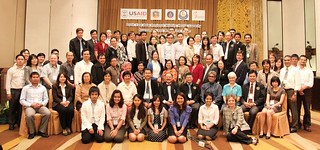TRUNG TÂM NGHIÊN CỨU Y TẾ CÔNG CỘNG VÀ HỆ SINH THÁI
CENTER FOR PUBLIC HEALTH AND ECOSYSTEM RESEARCH
CENPHER

The United States Agency for International Development’s (USAID) Emerging Pandemic Threats (EPT) program is implementing a capacity-strengthening program worldwide to improve global response to emerging infectious diseases (EIDs). The premise of the USAID/EPT program is that future EIDs are likely to arise from the growing interface between human and wild animal populations. One of the aims of the EPT program is to counteract this threat by building capacity in wildlife health, including disease surveillance and outbreak response for zoonoses and EIDs.
Countries in Southeast Asia have significant wildlife resources, facing similar challenges and threats, including legal and illegal wildlife trade, human and wildlife conflict issues, and wildlife diseases. Additionally, wildlife is part of the region’s unique biodiversity and contributes to well functioning ecosystem that is closely linked to human health. Although wildlife resources are important in Southeast Asia, the capacity of governments to respond to wildlife disease threats, and of universities and other organizations to train future wildlife health professionals with an awareness of One Health approaches to EIDs in wildlife, varies considerably from country to country. The emergence of infectious diseases that threaten both human and animal urges countries in the region to strengthen capacity to prevent, detect, and respond to disease outbreaks in wildlife.
The regional wildlife health forum is designed to bring together government agencies with oversight over wildlife health and conservation, and universities and other organizations that contribute to strengthening capacity in wildlife health. The overarching goals are (i) to establish a shared understanding of the status of wildlife health protection and management in the region i.e., who is working on wildlife health and what resources (both technical and financial) are available to support the work and strengthen capacity, (ii) to facilitate university and government dialogue concerning the strengthening of wildlife health capacity; and to identify opportunities to strengthen wildlife health management at both the country and regional level.
The co-hosting agencies for the wildlife health forum are (1) Thailand Ministry of Natural Resources and Environment, Department of National Parks (DNP), (2) Zoological Park Oganization (ZPO) of Thailand, and (3) Mahidol University, Faculty of Veterinary Science. The meeting was supported by the USAID/EPT/RESPOND program and the South East Asia One Health University Network (SEAOHUN).

Participants at the workshop
Representatives of government agencies and universities in the Vietnam One Health University Network (VOHUN), who have been doing work related to wildlife and animal health and zoonotic diseases attended this workshop. At the networking forum, Dr. Pham Duc Phuc on behalf of SEAOHUN and VOHUN members presented an overview of SEAOHUN and VOHUN activities, in particular the capacity building and training of wildlife health professionals. We also discussed about the current status of wildlife health resources, including wildlife health policy and activities, identified the wildlife challenges, wildlife health training needs, resources and opportunities, government-university partnerships for wildlife health capacity building, and building national and regional wildlife health capacity.
During the forum, the market place activity provided an opportunity for delegates to learn about different programs and organizations in the region whose resources might benefit their government agencies. Stakeholder organizations brought their materials (such as posters, videos, newsletters, other promotional materials) introducing their programs. Delegates and stakeholders also discussed on the issues and challenges as well as resources to develop linkages and explore potential collaboration for the future.
Click here to download the presentation of Dr. Pham Duc Phuc - Program Coordinator of the VOHUN